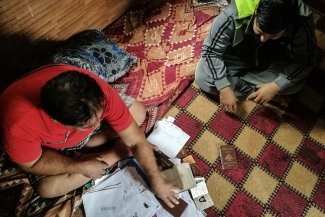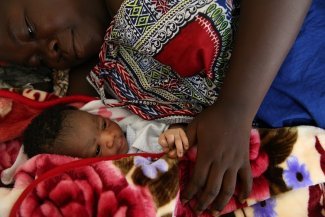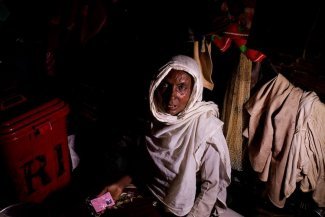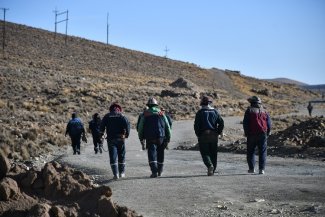At the wheel of his car, Hakim, wearing a blue djellaba, drives through the town of al-Ahmadi, built by and for the workers of the Kuwait National Petroleum Company. “There are two types of Bidoon in Kuwait,” he explains. “Those who worked in the oil industry and those who were in the army or the police.” This leading activist of the Bidoon cause in Kuwait adds: “Until 1990, the Bidoon enjoyed the same rights as all Kuwaiti citizens and took part in this country’s construction. In the 1960s and 1970s, over 80 per cent of the armed forces were Bidoon.”
The Bidoon – Arabic for ‘without’, implying ‘without nationality’ – are a stateless Arab minority in Kuwait. They should not be confused with the Bedouin, who are nomads living in the desert, although many Bidoon are descendants of nomadic tribes from the Arabian Peninsula. Most Bidoon are now categorised by the Kuwaiti authorities as ‘illegal residents’, despite having no links to other countries.
The Bidoon Committee, the central authority for dealing with the status of illegal residents, established in 2010, is a public institution intended to resolve nationality issues by granting citizenship to those entitled to it. Very few Bidoon have, however, been able to benefit from this process, as the committee regularly claims, without foundation, that they belong to another nationality. The authorities’ approach to them became harsher after the Iraqi occupation, from 1990 to 1991, suspecting them of having “collaborated with the enemy”.

Nawaf, aged 37, works as a taxi driver. He shows the documents of his uncle who obtained Kuwaiti citizenship in 1973, but since his father did not have citizenship, he cannot have it.
They are faced with a range of pressures to reveal their supposed ‘real nationality’. They are attributed nationalities based on their physical traits: “You look like an Iraqi,” they have been told, for example. Although some of them have been able to obtain identity documents, with the reference “non-Kuwaiti”, since 2011, and the first demonstrations to defend their rights, it has become almost impossible for them to renew them.

Hussain works in an automobile garage. In 2009, corrupt officials suggested he should buy a fake EU passport, which he went to collect from the public authorities.
According to some Bidoon, they are offered fake passports to push them into exile. In 2009, after being arrested during a traffic inspection, Hussain found himself in front of an Egyptian* official, in a Bidoon Committee office. The official presented him with a card with the contact details of a person from whom he could buy a fake passport. After meeting this person, Hussain decided to buy a fake Danish passport, “because it was the cheapest”, he says. As agreed with the Egyptian agent, he went to his office to hand in his new fake passport. A few days later, he went to pick up his fake passport from the public authorities.

Abdul Razaq, aged 73, shares memories of his time in the Kuwaiti police force, where he worked for over 10 years until the Iraqi invasion in 1990. Now, the authorities are refusing to give him nationality and a retirement pension.
They are also now excluded from the army, the public administration and the civil service. When they are not directly harassed by the authorities, who tell them to close their businesses or have their goods confiscated, the Bidoon are discriminated against in the labour market.
“I have been working for 12 years in the mail service of a public body, I am not entitled to paid holidays and I used to be paid €750. Last year, they decided to reduce my salary to €600,” says Bender, another Bidoon. He adds, by way of example, that the basic salary “of a teacher, even a foreigner, is €3900, whereas for a Bidoon it is €1350”.

A view of the Mutla desert in the Jahra region, where the Bidoon lived before the country’s independence. Today, the majority of them live in the surrounding towns, but continue to come here to relax with friends.
Their number is a sensitive issue. For many years, the authorities have been claiming that there are about 100,000 of them in Kuwait, which is clearly a huge underestimate. Hakim explains that confidential documents leaked on social media in 2016, on the government’s public policies for the Bidoon, refer to a figure of around 400,000 out of a national population of just under three million.

In the town of Taima, some 20 kilometres from the capital, Kuwait City, a road separates two worlds: on the left, comfortable housing reserved for Kuwaiti families, often granted by the government, while on the right, low breeze block houses, corrugated iron extensions and poor roads is the lot of the Bidoon.
The town of Taima is divided into several blocks, where the Bidoon came to settle in the 1970s, at the request of the state. They were built to bring an end to the traditional settlements, the ashish , where the Bidoon used to live. They were supposed to be temporary and the families were to be rehoused. But, 50 years on, they have never been given the opportunity to move elsewhere.

From Block 2 in Taima, residents have a direct view of one of the largest hospitals in the Persian Gulf, but the Bidoon, for lack of identity documents, only have access to basic treatment.
A few metres from these houses is a public school, in which stateless children cannot enrol. The majority of the Bidoon population is deprived of access to free education and health care. Those who can afford it pay for their children to go to private schools. They are also often denied marriage and birth certificates.

Abdallah works with his family in the Jahra desert, where he raises sheep, as did his ancestors.
Some progress has been made in recent years, thanks to the work of several Bidoon associations. Since 2014, around 100 Bidoon have been given the opportunity to enter public universities each year, subject to good school grades, although some areas of study such as medicine remain off-limits to them. “I just want freedom of movement,” says young Hassan, sitting in his tent from where he rents out horses. The 20-year-old is proud of his country and all its infrastructure, and says, “I just want to be able to travel with my friends.”














